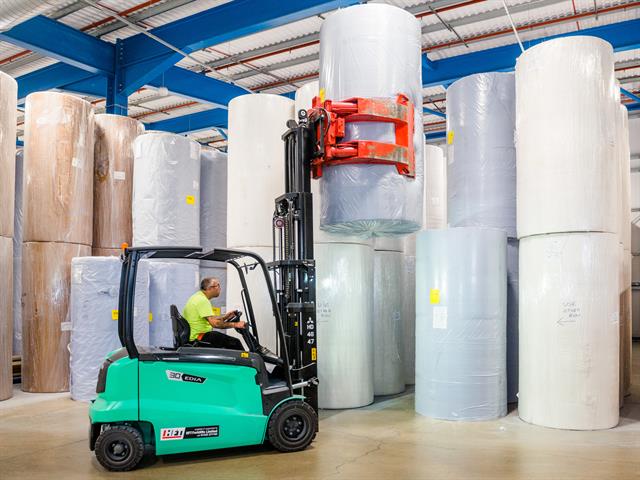 Stewart Gosling |
Stewart Gosling of Red Diamond Distribution, UK importer for Mitsubishi Forklift Trucks, is acknowledged for his expert knowledge of forklifts and is a regular member of the jury for the Fork Lift Truck Association Annual Awards for Excellence.
Sales of electric cars have grown exponentially in the past 18 months with a year-on-year increase of 184% in pure-electric registrations noted late last year. At the same time, sales of diesel cars fell by 38%.
That turnaround has been mirrored in the materials handling market with sales of electric counterbalance trucks, for the first time, set to reach near-parity with IC engine models (LPG and diesel) by the end of 2020.
Clearly, environmental awareness and impending changes to legislation on emissions are influencing both the automotive and materials handling markets, but the similarities don't end there.
With intelligent safety systems, and the capability to automatically adjust operating parameters to optimise the performance of each individual operator, a new breed of electric "super trucks" has more in common with high-end cars than conventional forklifts.
But what about cost? As H L Menken said: "When someone says it's not about the money, it's about the money." And it's true that the upfront cost of an IC engine truck is less than its electric equivalent. However, whole-life costs tell a very different story. A 2.5 T electric counterbalance working typical shifts of 6.5 hours a day over a five-year period will deliver average savings of 23% over an LP Gas or diesel equivalent.
And that gap is only likely to widen as manufacturers seek to recoup the costs of developing technically advanced engines that will conform to new Tier 5 standards.
So why, unlike our European counterparts, have we British proved so resistant to change? Well, my guess is that we traditionally take comfort in the perceived grunt of an engine truck - and the convenience of rapid refuelling.
Taking these in reverse order, the introduction of Li-ion has all but eliminated the need to change batteries between shifts. Instead, ultra-fast "opportunity charging" - even during the shortest breaks - keeps the battery replenished. What's more, unlike traditional lead acid equivalents, Li-ion batteries actually thrive on short sharp charge cycles.
So, what about the grunt? Well, that's a myth.
 Mitsubishi EDiA electric forklifts feature Li-ion power |
A new breed of super trucks, typified by the award-winning EDiA range from Mitsubishi Forklift Trucks, will do anything an IC model can do - only better. Equally at home indoors or outside, in sunshine or in rain, they offer unprecedented levels of safety, productivity and power - and do it without harmful emissions and noise.
It's why customers in every sector are switching motive power and are unequivocal in their praise for the new technology.
Take ESP. As the UK's leading independent manufacturer and supplier of disposable tissue products, the company produces 200,000 cases of finished product a month, keeping trucks running through eight-hour shifts, 24 hours a day, lifting hefty reels of paper to heights in excess of 3 m. It's a tough gig, but the EDIA EX more than met the company's challenge to achieve fume-free operations with no compromise on throughput.
Food giant Kellogg's is enjoying a similarly positive experience with a fleet of Li-ion trucks delivering safe, precise handling in the tightest possible spaces across a huge and complex site.
Intuitive handling automatically actually adapts performance characteristics to the driving style and ability of each individual driver. Intelligent curve control calculates the speed, angle and load and delivers the perfect balance of speed and safety to ensure optimum handling when cornering.
With stricter emission regulations coming into effect in 2021, maybe this will be the year that the UK finally puts heads before hearts and goes electric.